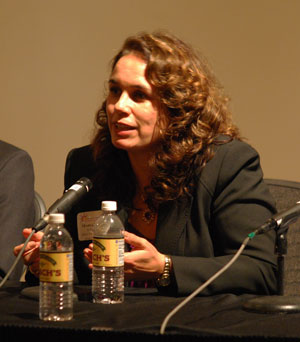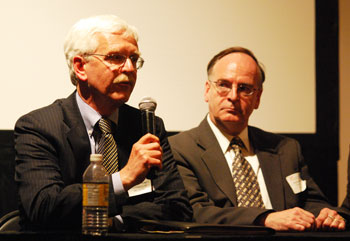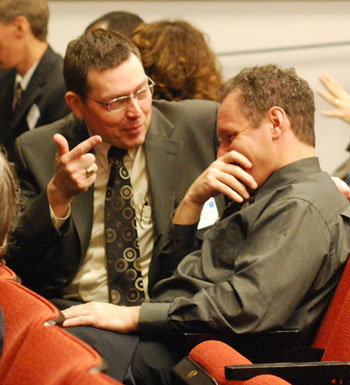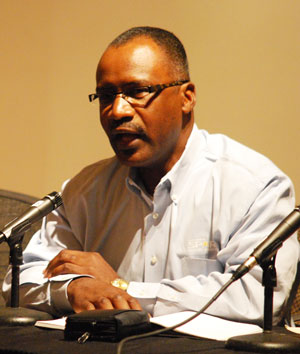Innovating out of an Economic Hole

Maria Thompson, general manager of the advanced research and government solutions group for A123Systems in Ann Arbor. She was one of several panelists from the local business community at Monday's UM economic development forum.
More than 250 people from academia, business, government and nonprofits packed the auditorium Monday afternoon at the Partnership for an Innovation Economy forum, hosted by the University of Michigan at its newly renovated art museum.
Throughout the two-hour event, The Chronicle learned, among other things: 1) which former Pfizer executive is a rugby referee, 2) which local power couples have relied on each other for advice, 3) who hosts one of the best holiday parties in Ann Arbor.
Of course, there was also much talk of UM’s role in economic development.
Steve Forrest, UM’s vice president for research, kicked off the forum by saying how deeply committed the university is to economic development. The event was a follow-up to a similar session they held about 18 months ago, he said, bringing together people in the community and within UM to talk about ways to partner. One of the results of those conversations is the launch of UM’s Innovation Economy website, he said. The idea is to provide a portal into all of the many university resources and programs that businesses can tap.
Forrest outlined trends in the Great Lakes economy – like the fact that manufacturing is no longer an economic driver. The region has to “get out of the mindset of denial,” he said, acknowledge that traditional manufacturing will never return, and transform quickly into a knowledge economy. Opportunities abound, he said, particularly in advanced auto manufacturing, green energy, health care and drug discovery.
UM is poised to take advantage of those opportunities, with its research expenditures pushing $1 billion this year, he said. “We have the resources. We have the talent.” What they don’t have, he added, is stable support from the state. Michigan lags all other states in its funding for higher education, and the university foresees that trend continuing. [UM president Mary Sue Coleman, along with leaders from other state universities, will be making their case for increased funding on Friday in testimony before the Senate Appropriations Subcommittee on Higher Education. The session, which is open to the public, begins at 10 a.m. in the Michigan League's Vandenberg Room, 911 N. University Ave., Ann Arbor.]
The solution to these challenges requires that all sectors of the economy – academics, industry, government and nonprofits – work together, Forrest said. He said they must use their regional strengths to compete on a global, not local, stage. He quoted Coleman, who in a 2006 speech to the National Press Club said that the university must “partner or perish.”
Forrest mentioned several efforts already underway: the Michigan Initiative for Innovation and Entrepreneurship, a consortium of the state’s public universities; UM’s own push to make entrepreneurship and working with industry a cultural value in their academic community; and the UM Business Engagement Center, designed to facilitate relationships between UM and industry.
They aren’t too big to fail, Forrest concluded. “We live in times of scary opportunities. They’re ours to miss.”
University Panel
Marvin Parnes, UM associate vice president for research and executive director of research administration, moderated the first of two panels, a group of five UM administrators whose work related to partnerships with industry. Daryl Weinert, executive director of UM’s Business Engagement Center, described BEC’s role as being advocates for the relationship between companies and academics. Within the past fiscal year, nearly 200 companies have come to the university for the first time seeking partnerships, he said – there’s pent-up demand, ranging from entrepreneurs in their garage to Fortune 500 companies. It can be difficult to work with small companies, he said, so they’ve been experimenting with different programs. Those include internships and career fairs focused on small businesses, as well as a small company innovation program, which gives financial incentives to small businesses to collaborate with UM on research projects.

Ken Nisbet, left, executive director of UM's Office of Technology Transfer, next to Steve Kunkel, senior associate dean for research at UM's Medical School.
Marian Krzyzowski, director of UM’s Institute for Research on Labor, Employment, and the Economy, talked about two programs at the institute: the Community Economic Adjustment Program (CEAP), and a program that provides customized business assistance to Michigan firms. Ypsilanti is one of the areas getting help from CEAP, which is participating in the Eastern Leaders Group project to revitalize that part of Washtenaw County.
Elaine Brock, senior associate director for UM’s Division of Research Development and Administration, said the university is trying to improve industry’s access to faculty. “We know that’s a concern,” she said. “It’s a big place, with way too many doors.”
Ken Nisbet, executive director of the Office of Technology Transfer, said the most effective forms of tech transfer are students. “I encourage you – go off and hire a student today,” he quipped. He ticked through the performance of the office: in fiscal 2008, they processed more than 300 invention disclosures, 91 licenses and other agreements with industry, 13 startup companies using UM technology, and they brought in more than $25 million in revenues from royalties and equity sales. They work with partners like Ann Arbor SPARK, MichBio, various chambers of commerce, Detroit Renaissance and others, he said. “We’re all in this together – we’re all committed to making Michigan a better place.”
The final speaker for this panel was Steve Kunkel, senior associate dean for research at UM’s Medical School. He praised the university’s decision to “plunk $108 million on the table” to buy the Pfizer research campus on Ann Arbor’s north side, and said they were in the due diligence stage, hoping to close the deal in mid-June. [That was roughly the same timeframe given earlier this year at a UM town hall meeting about the site.] Kunkel said they were figuring out how to use the space, trying to come up with a revolutionary way to conduct research. A committee is focused on innovation, he said, which might include moving the College of Engineering’s Center for Entrepreneurship to the site, and possibly setting up a business incubator there. Later in the forum, he said they hoped to make 3,000 new hires in the next 10 years at the site, and to bring in international partners. It’s “an opportunity not to do the same old thing,” he said.

Stephen Rapundalo, left, an Ann Arbor City Council member and president of MichBio, talks with state Rep. Ed Clemente before the start of Monday's forum. Clemente, who represents the 14th District, chairs the House New Economy Committee.
Business Panel
Rich Sheridan – CEO of Menlo Innovations, which throws one of the best holiday parties in Ann Arbor, Parnes told the audience – moderated the second panel. The four panelists gave perspectives from outside the university: Ed Krause, external alliances manager for Ford Motor Co.; Maria Thompson, general manager of the advanced research and government solutions group for A123Systems in Ann Arbor; Mike Finney, CEO of Ann Arbor SPARK; and Ed Clemente, state representative for the 14th District and chair of the House New Economy Committee.
Krause, a Saline resident, said that the Ford/UM Innovation Alliance, launched in 2006, started out as a primarily technical endeavor but has expanded dramatically. Even though they don’t bring in the kind of research funding that the federal government does, he said they’ve always been treated like a partner of equal value.
There are some ways to improve, Krause noted: 1) industry experience should play a greater role in the hiring and tenuring of faculty, 2) industry research should have a higher value in the tenure process, and 3) administrators should encourage faculty to take sabbaticals in industry.
Maria Thompson said the university is a lot easier for businesses to navigate now than it was when she and her husband, Levi Thompson – a UM chemical engineering professor – started their business in the early 1990s. But it’s always been a place of great resources, she said. Thompson said their business – formerly T/J Technologies, which is now a division of A123Systems – used interns from UM’s Zell-Lurie Institute for Entrepreneurial Studies to help write business plans, and other students to work on market research.
Thompson also said people in Ann Arbor have been willing to support each other – she and Levi have consulted with other couples who’ve started businesses together, like Heidi and Chuck Jacobus of Cybernet Systems, and in turn they’ve done the same for younger entrepreneurs like Michelle and Aaron Crumm of Adaptive Materials. She encouraged people attending on Monday to stay for the reception that followed the forum, saying it was important to take advantage of these kinds of networking opportunities.
Mike Finney, CEO of the economic development agency Ann Arbor SPARK, recalled one of his own ties to UM – president Mary Sue Coleman had called him when he was being recruited for this job, he said. It worked.
Finney said SPARK is really a regional marketing organization, trying to sell the Ann Arbor area to businesses who might want to locate here. He said that two-thirds of the projects they’ve worked on to bring businesses to this area have had very direct connections to UM. He’s able to pick up the phone and call people at UM, who’ll help provide connections to these businesses through faculty, staff or alumni. His peers doing economic development in other regions don’t have that kind of access, he said.
Referring to a comment by Daryl Weinert earlier in the forum, Finney said that when the university gets 200 businesses calling the Business Engagement Center, he salivates – that’s 200 prospects that Ann Arbor SPARK doesn’t have to find. He said one way for UM to improve would be for the university to reach out to his counterparts throughout the state, and play an even greater role in the resurgence of the state’s economy.
The final panelist to speak was Ed Clemente, a state representative from the 14th District, which includes part of Wayne County. Clemente told of his own recent Pfizer connection – he’d been playing rugby last weekend at Riverside Park in Ann Arbor and ran into David Canter, former head of the local Pfizer campus and now director of healthcare research at UM’s William Davidson Institute, who is a rugby referee.
Clemente, who chairs the House New Economy Committee, said that everyone’s looking for a silver bullet to fix the state’s economy, but in reality, incremental growth is the way that change will occur. The state needs to create an environment conducive to innovation, he said, noting that Michigan is going to be great again, “it’s just going to be very different.”
After the presentation, panelists took questions from the audience. Here’s a sampling:
- What other kinds of coordination should UM be doing? Maria Thompson said having one-stop shopping is important, because entrepreneurs are so busy dealing with their business that they need to get information efficiently. Ed Krause of Ford suggested having a more coordinated approach to partner with industry and go after federal stimulus funding.
- What new approaches is UM taking to manage intellectual property? What’s being done to address the high cost of working with the university? What can be done to create more urgency on UM projects? Elaine Brock said it’s important to recognize that the university is a university, not industry. That said, “we are listening” to concerns, she said. As for cost, she said that the university operates on a cost-reimbursement model, but they don’t make a profit. Ed Krause advised businesses not to hire the university for contract engineering, but that when your business wants to try something new, UM brings the kind of equipment and expertise that you can’t find elsewhere. Ken Nisbet said UM has seen a sea-change in responsiveness to industry, but they can always be better. “We’re really trying.”
- How can we overcome the lack of strategic planning in Lansing? Saying that he didn’t really have a good answer, Ed Clemente suggested that individuals need to press state legislators on both sides of the aisle to make changes. Legislators will listen, he said, as long as you don’t yell. He said it doesn’t help to simply talk to Ann Arbor legislators – you need to reach out to other lawmakers, too.
As the forum wrapped up, Forrest said he’d taken notes about some of the suggestions that had been offered about ways that UM can improve its relationship with the business community. “We’ll keep doing this,” he said. “We are very dedicated to doing this.”






Its great to see that University of Michigan is so proactive, after reading the information on this web site. They design themselves for keying into today’s economy, taking leadership. U of M is quite the leader in Ann Arbor. Of course, a big 10 school. And its great that we have them. For all of us that live in Ann Arbor, we are lucky to be here, in such a technology oriented town.